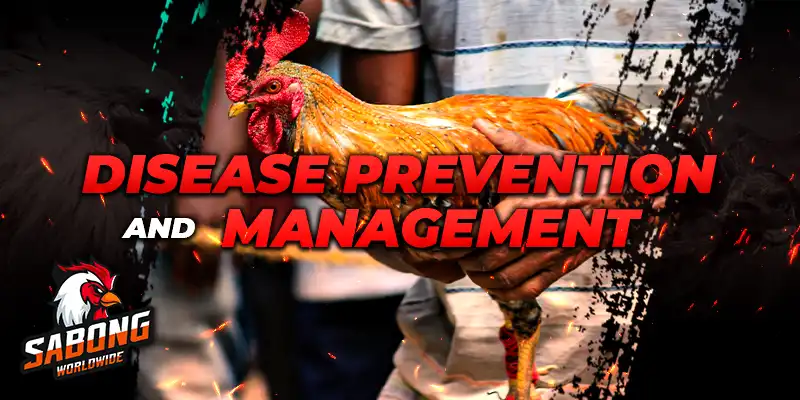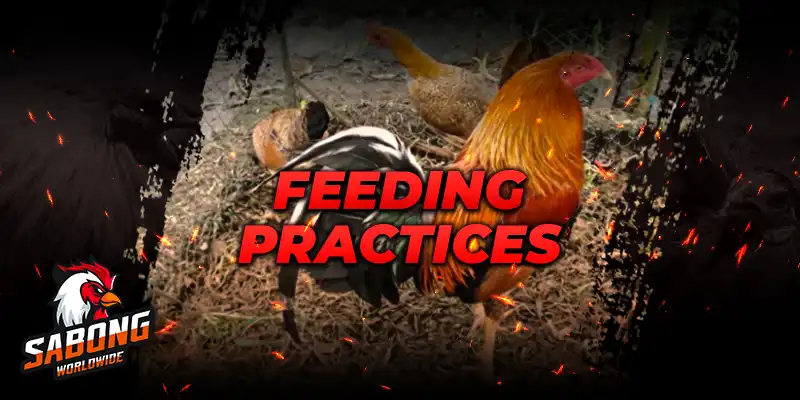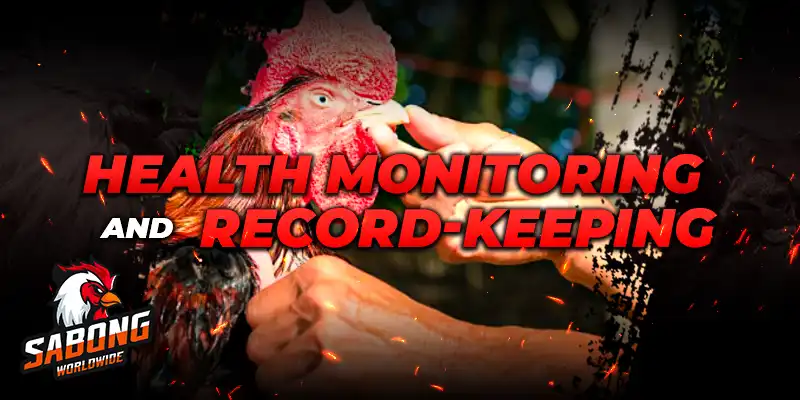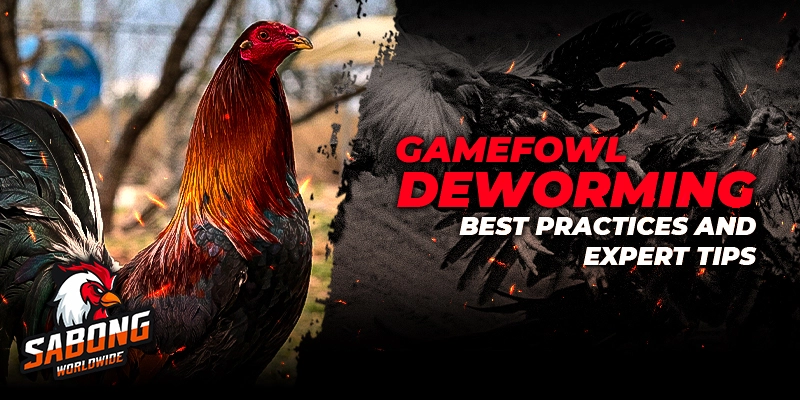Keeping our birds healthy and happy is our top priority in the gamefowl world. After all, healthy birds are strong birds! Simple steps can prevent problems, keep them disease-free, and help them reach their full potential.
By prioritizing Gamefowl health and nutrition, we create a powerful combination. Not only will our birds be less likely to get sick, but they’ll also grow up strong and be able to showcase their natural abilities, whether it’s breeding healthy offspring or excelling in competition.
Disease Prevention and Management
Protecting our flocks from illness is important for successful gamefowl keeping. To stay ahead of diseases, we focus on:
Vaccination Programs
We vaccinate our birds against common poultry diseases like Newcastle, Fowlpox, and Infectious Bronchitis. Following recommended schedules helps build immunity.
Deworming and Parasite Control
Internal worms and external parasites can weaken birds. We deworm regularly and use treatments to control lice, mites, and other pests.
Common Gamefowl Diseases
Awareness of frequent issues like Coryza, Fowl Cholera, and Marek’s Disease allows us to catch symptoms early for treatment.
Disease Transmission and Vectors
To implement preventive measures, we learn how diseases spread through vectors like wild birds, rodents, and contaminated equipment.
Quarantine and Isolation Protocols
New arrivals are isolated, and sick birds are separated to contain illness and avoid transmission to the whole flock.
Biosecurity Measures
Maintaining high biosecurity standards protects our operations from disease introductions. Our protocols include:
- Facility Sanitation and Hygiene: We clean coops, runs, feeders, and waters through regular disinfection to eliminate germs.
- Visitor and Traffic Control: Outside visitors can carry diseases, so we restrict and screen facility access to reduce risks.
- Pest Management: Rodents, insects, and wild birds can spread illness. To control pests, we use deterrents, traps, and enclosed housing.
- Equipment and Supply Disinfection: Any new equipment, crates, or supplies are properly cleaned and disinfected before being used with our birds.
- Biosecurity During Transportation: When moving birds, we sanitize crates and vehicles and practice rigorous protocols to avoid exposing them to pathogens.
Nutritional Requirements
Providing complete, balanced nutrition supports our gamefowl’s growth, health, and performance. Their needs vary by:
Nutrient Needs by Life Stage
Chicks, growers, breeders, and stags all require specific nutrient levels for their life stages, which we carefully formulate in rations.
Protein Sources and Requirements
Adequate protein from quality sources like meat, soymeal, and peas builds muscle and fuels the development of growing birds.
Energy Sources and Requirements
Cracked corn, wheat, and other grains provide important calorie energy, especially for active stags and breeders.
Vitamin and Mineral Requirements
Micronutrients like Vitamins A, D, and E and minerals like calcium and phosphorus are essential for numerous bodily functions.
Nutrient Interactions and Balances
Getting the right nutrient ratios and avoiding excesses or deficiencies is key for health. We carefully balance diets.
Feeding Practices
How we provide feed and nutrition is as vital as what’s in it. Our best practices include:
Feed Formulations and Rations
We develop customized rations with precise nutrient levels for each group using quality ingredients like corn and soy meal.
Feeding Schedules and Regimens
Consistent schedules and routines for feeding proper rations help birds develop to their full potential.
Feeding Systems and Equipment
Clean feeders and water prevent contamination. Automated systems can increase efficiency and reduce labor needs.
Feed Storage and Handling
Feed is stored properly to prevent spoilage, moisture, and pest issues that could make birds sick if consumed.
Grit and Oyster Shell Supplementation
Providing insoluble grit and calcium-rich oyster shells as supplements aids digestion and egg production.
Supplements and Additives
In addition, to complete rations, we may utilize specially formulated supplementary products, such as:
Probiotics and Prebiotics
These beneficial live microbes and food sources promote healthy gut microbiomes and digestion in our fowl.
Enzymes and Digestive Aids
Adding enzymes like phytase helps break down tough feed components, increasing nutrient absorption.
Immune Boosters and Tonics
Herbs, vitamins, and other immune-enhancing supplements can help birds better resist diseases.
Performance Enhancers
Select supplements may increase muscle development, stamina, and recovery to optimize competitive performance.
Natural and Herbal Supplements
Herbal and botanical-based products provide alternative treatment and nutrition support options.
Water Management
Access to clean, fresh water is important for gamefowl health. Our water protocols involve:
- Water Quality and Purification: Purified or treated water removes contaminants that could spread illness if consumed.
- Water Source Management: We maintain water sources like wells and storage tanks through regular cleaning and disinfection.
- Watering Systems and Equipment: Watering fonts, nipples, and lines are designed for cleanliness and monitored to ensure proper function.
- Water Intake Monitoring: Tracking daily water consumption helps identify potential health issues with dehydrated or non-drinking birds.
- Water Additives and Treatments: We may add vitamins, electrolytes, or disinfectants to water supplies to boost nutrition or control bacteria.
Environmental Factors
The overall environment birds are kept in significantly impacts their health status. We carefully manage:
Housing and Facility Design
Coops and pens provide proper space, ventilation, and shelter to reduce stress and disease risks for occupants.
Temperature and Humidity Control
Maintaining ideal temperature and humidity ranges specific to each life stage prevents respiratory and other issues.
Ventilation and Air Quality
Good air circulation and quality control dust and ammonia buildup that can damage respiratory systems.
Lighting and Photoperiod Management
For optimal conditions, regulating light cycles ensures normal resting, breeding, and molting patterns.
Litter and Waste Management
Frequently changing litter and properly disposing of waste minimizes exposure to harmful bacteria and pests.
Health Monitoring and Record-Keeping
Diligent monitoring and detailed records allow us to stay ahead of potential health problems, including:
- Physical Examination and Observation: Inspecting and evaluating birds allows us to catch any abnormalities or signs of illness early.
- Weight and Condition Monitoring: Tracking weights, body scores, and development ensures that fowl grow and progress properly.
- Flock Health Records: Thorough documentation of treatments, tests, mortalities, and other events informs future decisions.
- Necropsy and Disease Diagnosis: Examining deceased birds can identify internal parasites, lesions, and other evidence pinpointing the cause of death.
- Data Analysis and Decision-Making: Reviewing compiled records helps us spot patterns, assess program efficacy, and make any needed adjustments.
Conclusion
In conclusion, keeping gamefowl healthy and well-nourished is important for their well-being and performance. We ensure our birds are healthy, strong, and ready to compete by using thorough disease prevention methods, strong nutrition plans, and strict cleanliness practices. Our main strategies include proper vaccination and deworming schedules, effective pest control, and nutrition that meets the needs of birds at different stages of their lives.
These actions help prevent health issues and promote healthy growth and performance, allowing our gamefowl to excel in breeding and competition. Our dedication to excellent care ensures our flock is thriving and strong.
For more comprehensive advice, detailed strategies, and practical tips, visit Sabong Worldwide.












